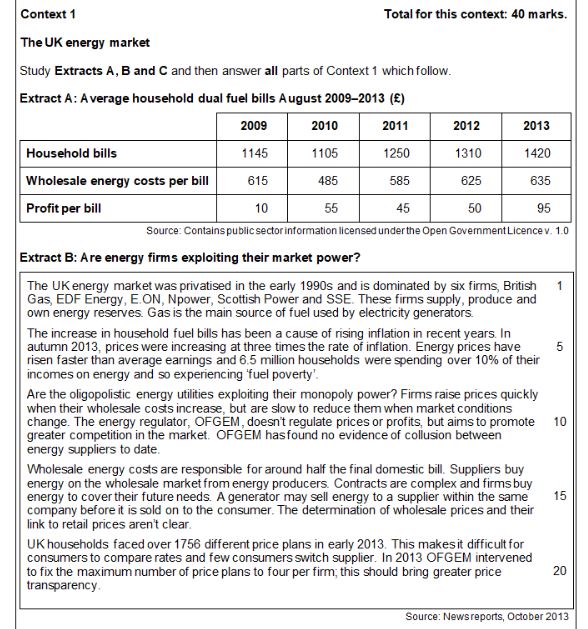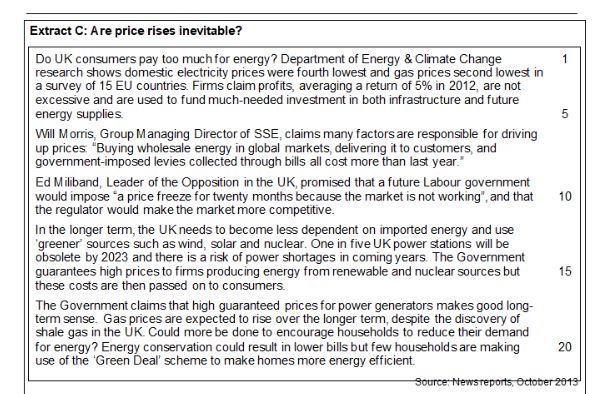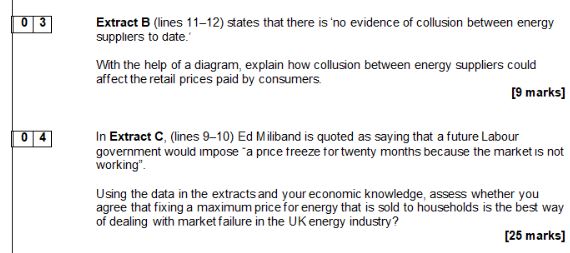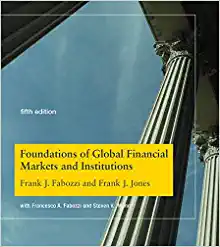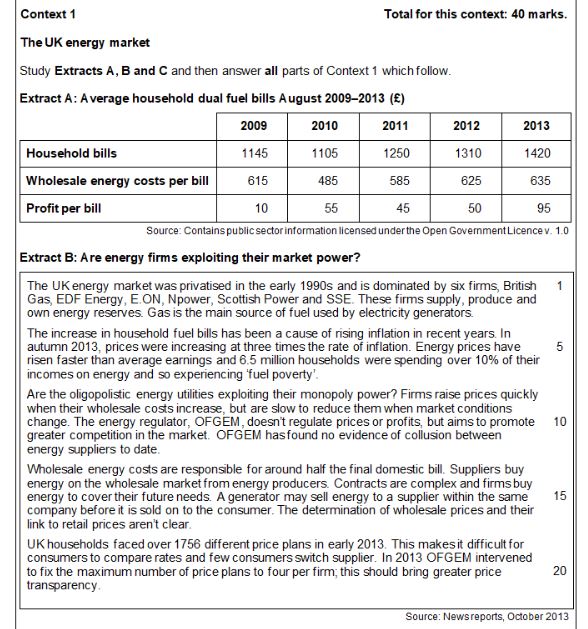
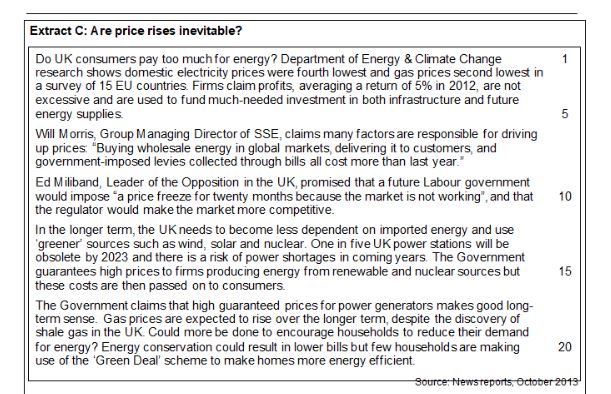
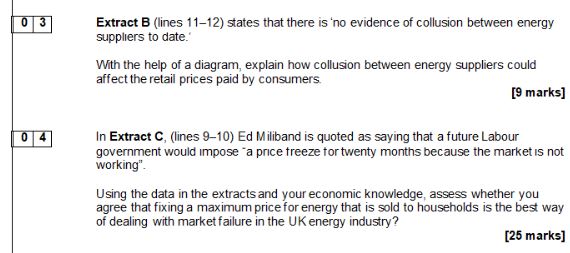
AQA A level (9mark) question and the (25 mark) question a B+ model answer please, the mark scheme: https://filestore.aqa.org.uk/resources/economics/AQA-71361-SMS.PDF
below is the extract and the questions thanks.
Context 1 Total for this context: 40 marks. The UK energy market Study Extracts A, B and C and then answer all parts of Context 1 which follow. Extract A: Average household dual fuel bills August 2009-2013 (E) 2009 2010 2011 2012 2013 Household bills 1145 1105 1250 1310 1420 Wholesale energy costs per bill 615 485 585 625 635 Profit per bill 10 55 45 50 95 Source: Contains public sector information licensed under the Open Government Licence v. 1.0 Extract B: Are energy firms exploiting their market power? The UK energy market was privatised in the early 1990s and is dominated by six firms, British Gas, EDF Energy, E. ON, Npower, Scottish Power and SSE. These firms supply, produce and own energy reserves. Gas is the main source of fuel used by electricity generators. The increase in household fuel bills has been a cause of rising inflation in recent years. In autumn 2013, prices were increasing at three times the rate of inflation. Energy prices have 5 risen faster than average earnings and 6.5 million households were spending over 10% of their incomes on energy and so experiencing fuel poverty' Are the oligopolistic energy utilities exploiting their monopoly power? Firms raise prices quickly when their wholesale costs increase, but are slow to reduce them when market conditions change. The energy regulator, OFGEM, doesn't regulate prices or profits, but aims to promote 10 greater competition in the market. OFGEM hasfound no evidence of collusion between energy suppliers to date. Wholesale energy costs are responsible for around half the final domestic bill. Suppliers buy energy on the wholesale market from energy producers. Contracts are complex and firms buy energy to cover their future needs. A generator may sell energy to a supplier within the same 15 company before it is sold on to the consumer. The determination of wholesale prices and their link to retail prices aren't clear. UK households faced over 1756 different price plans in early 2013. This makes it difficult for consumers to compare rates and few consumers switch supplier. In 2013 OFGEM intervened to fix the maximum number of price plans to four per firm; this should bring greater price 20 transparency. Source: News reports, October 2013Extract C: Are price rises inevitable? Do UK consumers pay too much for energy? Department of Energy & Climate Change research shows domestic electricity prices were fourth lowest and gas prices second lowest in a survey of 15 EU countries. Firms claim profits, averaging a return of 5% in 2012, are not excessive and are used to fund much-needed investment in both infrastructure and future energy supplies 5 Will Morris, Group Managing Director of SSE, claims many factors are responsible for driving up prices, "Buying wholesale energy in global markets, delivering it to customers, and government-imposed levies collected through bills all cost more than last year." Ed Miliband, Leader of the Opposition in the UK, promised that a future Labour government would impose "a price freeze for twenty months because the market is not working", and that 10 the regulator would make the market more competitive. In the longer term, the UK needs to become less dependent on imported energy and use "greener' sources such as wind, solar and nuclear. One in five UK power stations will be obsolete by 2023 and there is a risk of power shortages in coming years. The Government guarantees high prices to firms producing energy from renewable and nuclear sources but 15 these costs are then passed on to consumers. The Government claims that high guaranteed prices for power generators makes good long- term sense. Gas prices are expected to rise over the longer term, despite the discovery of shale gas in the UK. Could more be done to encourage households to reduce their demand for energy? Energy conservation could result in lower bills but few households are making 20 use of the 'Green Deal' scheme to make homes more energy efficient. Source: News reports, October 20130 3 Extract B (lines 11-12) states that there is 'no evidence of collusion between energy suppliers to date.' With the help of a diagram, explain how collusion between energy suppliers could affect the retail prices paid by consumers [9 marks] 0 4 In Extract C, (lines 9-10) Ed Miliband is quoted as saying that a future Labour government would impose a price freeze for twenty months because the market is not working" Using the data in the extracts and your economic knowledge, assess whether you agree that fixing a maximum price for energy that is sold to households is the best way of dealing with market failure in the UK energy industry? [25 marks]



